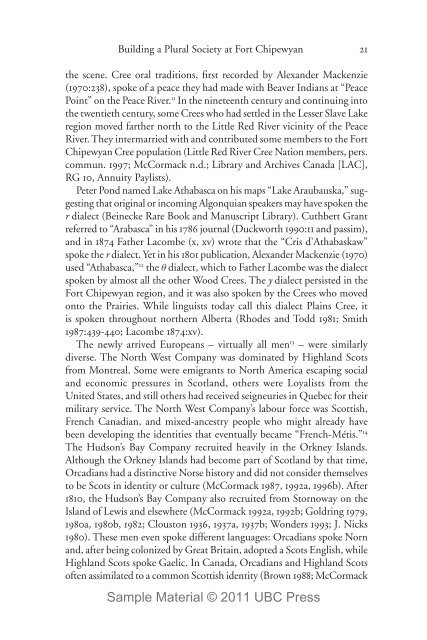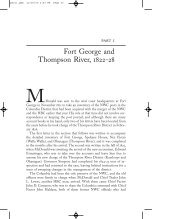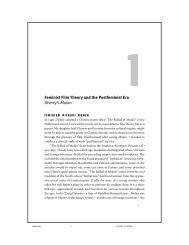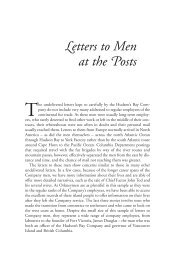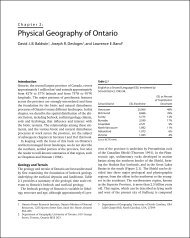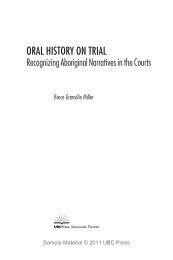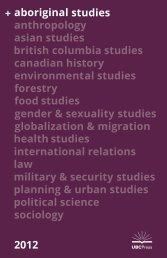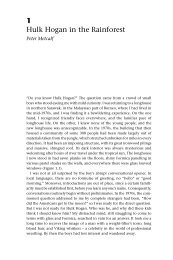Fort Chipewyan and the Shaping of Canadian History ... - UBC Press
Fort Chipewyan and the Shaping of Canadian History ... - UBC Press
Fort Chipewyan and the Shaping of Canadian History ... - UBC Press
Create successful ePaper yourself
Turn your PDF publications into a flip-book with our unique Google optimized e-Paper software.
Building a Plural Society at <strong>Fort</strong> <strong>Chipewyan</strong><br />
<strong>the</strong> scene. Cree oral traditions, first recorded by Alex<strong>and</strong>er Mackenzie<br />
(1970:238), spoke <strong>of</strong> a peace <strong>the</strong>y had made with Beaver Indians at “Peace<br />
Point” on <strong>the</strong> Peace River. 11 In <strong>the</strong> nineteenth century <strong>and</strong> continuing into<br />
<strong>the</strong> twentieth century, some Crees who had settled in <strong>the</strong> Lesser Slave Lake<br />
region moved far<strong>the</strong>r north to <strong>the</strong> Little Red River vicinity <strong>of</strong> <strong>the</strong> Peace<br />
River. They intermarried with <strong>and</strong> contributed some members to <strong>the</strong> <strong>Fort</strong><br />
<strong>Chipewyan</strong> Cree population (Little Red River Cree Nation members, pers.<br />
commun. 1997; McCormack n.d.; Library <strong>and</strong> Archives Canada [LAC],<br />
RG 10, Annuity Paylists).<br />
Peter Pond named Lake Athabasca on his maps “Lake Araubauska,” suggesting<br />
that original or incoming Algonquian speakers may have spoken <strong>the</strong><br />
r dialect (Beinecke Rare Book <strong>and</strong> Manuscript Library). Cuthbert Grant<br />
referred to “Arabasca” in his 1786 journal (Duckworth 1990:11 <strong>and</strong> passim),<br />
<strong>and</strong> in 1874 Fa<strong>the</strong>r Lacombe (x, xv) wrote that <strong>the</strong> “Cris d’Athabaskaw”<br />
spoke <strong>the</strong> r dialect. Yet in his 1801 publication, Alex<strong>and</strong>er Mackenzie (1970)<br />
used “Athabasca,” 12 <strong>the</strong> dialect, which to Fa<strong>the</strong>r Lacombe was <strong>the</strong> dialect<br />
spoken by almost all <strong>the</strong> o<strong>the</strong>r Wood Crees. The y dialect persisted in <strong>the</strong><br />
<strong>Fort</strong> <strong>Chipewyan</strong> region, <strong>and</strong> it was also spoken by <strong>the</strong> Crees who moved<br />
onto <strong>the</strong> Prairies. While linguists today call this dialect Plains Cree, it<br />
is spoken throughout nor<strong>the</strong>rn Alberta (Rhodes <strong>and</strong> Todd 1981; Smith<br />
1987:439-440; Lacombe 1874:xv).<br />
The newly arrived Europeans – virtually all men 13 – were similarly<br />
diverse. The North West Company was dominated by Highl<strong>and</strong> Scots<br />
from Montreal. Some were emigrants to North America escaping social<br />
<strong>and</strong> economic pressures in Scotl<strong>and</strong>, o<strong>the</strong>rs were Loyalists from <strong>the</strong><br />
United States, <strong>and</strong> still o<strong>the</strong>rs had received seigneuries in Quebec for <strong>the</strong>ir<br />
military service. The North West Company’s labour force was Scottish,<br />
French <strong>Canadian</strong>, <strong>and</strong> mixed-ancestry people who might already have<br />
been developing <strong>the</strong> identities that eventually became “French-Métis.” 14<br />
The Hudson’s Bay Company recruited heavily in <strong>the</strong> Orkney Isl<strong>and</strong>s.<br />
Although <strong>the</strong> Orkney Isl<strong>and</strong>s had become part <strong>of</strong> Scotl<strong>and</strong> by that time,<br />
Orcadians had a distinctive Norse history <strong>and</strong> did not consider <strong>the</strong>mselves<br />
to be Scots in identity or culture (McCormack 1987, 1992a, 1996b). After<br />
1810, <strong>the</strong> Hudson’s Bay Company also recruited from Stornoway on <strong>the</strong><br />
Isl<strong>and</strong> <strong>of</strong> Lewis <strong>and</strong> elsewhere (McCormack 1992a, 1992b; Goldring 1979,<br />
1980a, 1980b, 1982; Clouston 1936, 1937a, 1937b; Wonders 1993; J. Nicks<br />
1980). These men even spoke different languages: Orcadians spoke Norn<br />
<strong>and</strong>, after being colonized by Great Britain, adopted a Scots English, while<br />
Highl<strong>and</strong> Scots spoke Gaelic. In Canada, Orcadians <strong>and</strong> Highl<strong>and</strong> Scots<br />
<strong>of</strong>ten assimilated to a common Scottish identity (Brown 1988; McCormack<br />
Sample Material © 2011 <strong>UBC</strong> <strong>Press</strong><br />
21


